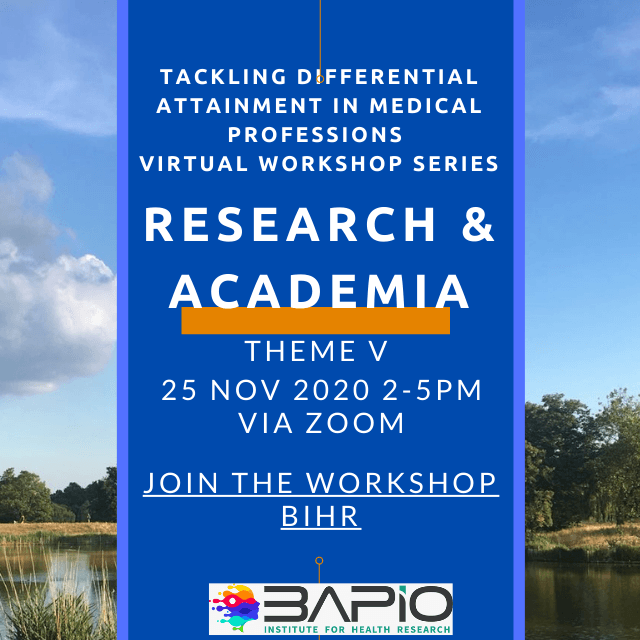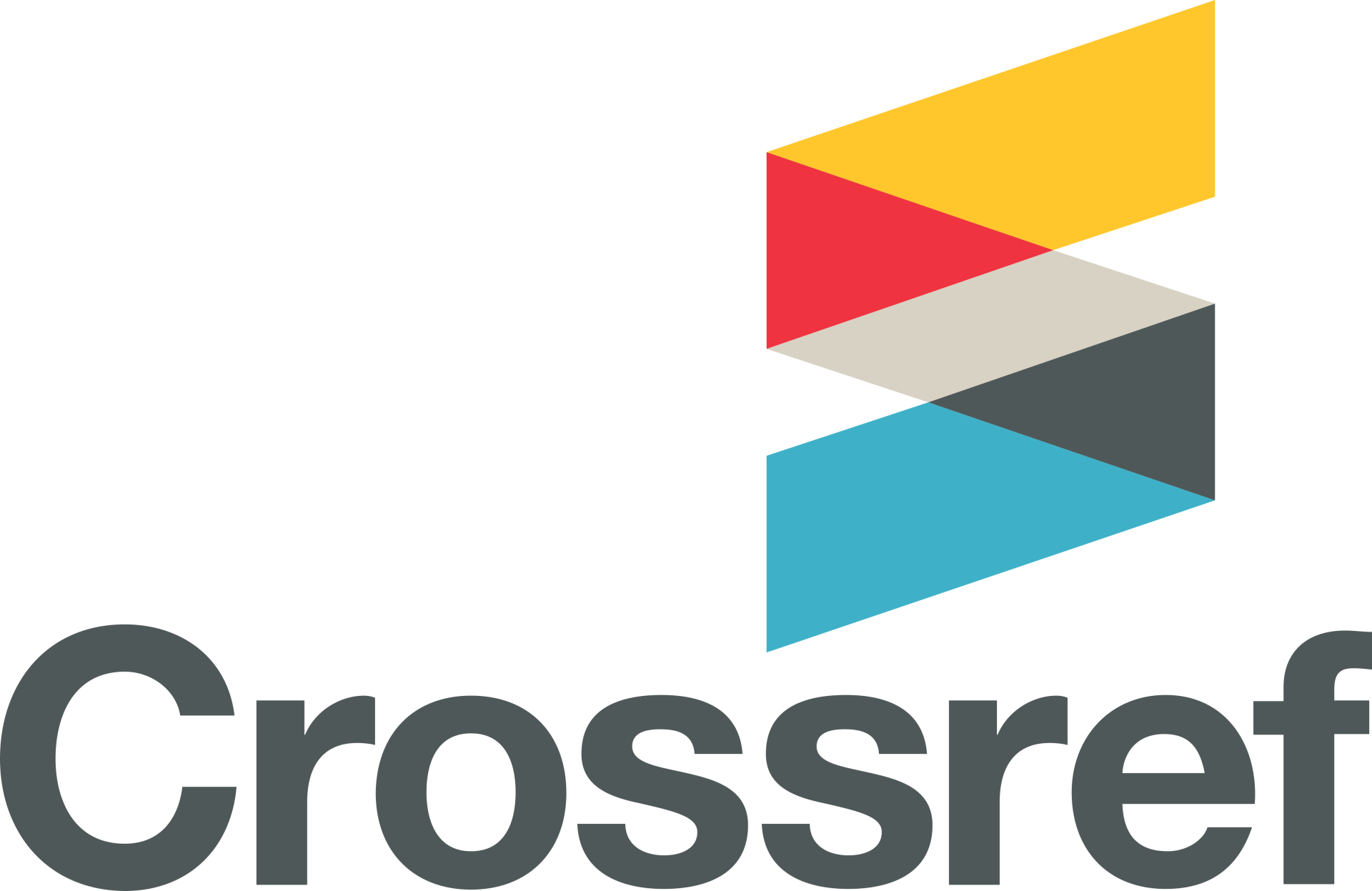TACKLING DIFFERENTIAL ATTAINMENT IN RESEARCH & ACADEMIA
FOR
THE MEDICAL PROFESSION
TACKLING DIFFERENTIAL ATTAINMENT IN RESEARCH & ACADEMIA
FOR
THE MEDICAL PROFESSION
VIRTUAL ZOOM WORKSHOP 25 Nov 2020 2-5 pm (GMT)
VIRTUAL ZOOM WORKSHOP 25 Nov 2020 2-5 pm (GMT)
BRIDGING THE GAP WORKSHOP SERIES 20-21
AIMS
AIMS
This workshop will bring together international experts, a range of stakeholders and medical professionals from all stages of training or career progression, to focus on the area of differential attainment/ award based on race, ethnicity, gender, disability and other protected characteristics
- To explore the whole range of opportunities in research & academia which are critical for recognising the contribution of all professionals
- To discuss the causes, the impact and develop a consensus on solutions.
WORKSHOP LEADS
- PROJECT CHAIR - Ramesh Mehta OBE (President, BAPIO)
- PROJECT LEAD - Indranil Chakravorty (Chair, Bapio Institute for Health Research)
- FACILITATOR - Martin Fischer (Fischer Associates)
- COORDINATOR - Subarna Chakravorty (Kings College Hospital, London)
- LEAD - Sunil Daga (Leeds Teaching Hospitals)
- LEAD - Rakesh Patel (University of Nottingham)
- LEAD - Anindita Roy (University of Oxford)
- LEAD - Neeraj Bhala (University of Birmingham)
- LEAD - Shivani Sharma (University of Hertfordshire)
Participants
Deena Iskander (ACL)
Chitra Joseph (Research fellow)
Kate Murnane (Dphil student)
Sam Weber
David Cruz Walma (PhD student)
Rachel Davies (Med student)
Sarah Wideman (PhD student)
Hannah Sharpe (PhD student)
Harveen Brar (UG applying for Med)
Megan Cosgrove (PhD-UK, now Med_NY)
Lena Weber (visiting medical student)
Veena Patel, University of Leicester
Carlos Curtis-Lopez, University of Manchester
Cathy Dominic, Queen Mary's University of London
M Shirke, Queen's University of Belfast
Daniel Robinson, University of Manchester
Prof Ala Szczepura, University of
Coventry
Blood Cancer UK
(Helen R, Fatima S)
Kidney Research UK
(Andy Lewington)
Cancer Research UK
(Sue Russell)
Royal College of Pathologists
(Prof Angharad Davies)
Association of Medical Research Charities
(Tom Baggaley)
BMA Academics
(Raj Gupta)
BMA Head of Equality, Inclusion & Culture (Aishnine Benjamin)
Equality Diversity & Inclusion in Science
-Health
(Lilian Hunt)
Wellcome Trust (Diego Baptista)
Narrowing the gap in careers in clinical research and academia for healthcare professionals:
A scoping review on the role of major funding bodies in the UK
Carlos Curtis-Lopez1, Daniel Robinson1, Manasi Shirke2, Catherine Dominic3, Shivani Sharma4, Anindita Roy5, Neeraj Bhala6, Sunil Daga7, Rakesh Patel8
1. University of Manchester; 2. School of Medicine, Belfast; 3. Bart’s and the London School of Medicine; 4. University of Hertfordshire; 5. Department of Paediatrics and MRC WIMM, University of Oxford; 6.University Hospital of Birmingham NHS Trust and BAPIO Institute for Health Research; 7. Leeds Teaching Hospital NHS Trust and BAPIO Institute for Health Research; 8. University of Nottingham
Rakesh.Patel@nottingham.ac.uk
Cite as: Curtis-Lopez, C., Robinson, D., Shirke, M., Dominic, C., Sharma, S., Roy, A., Bhala, N., Daga, S., Patel, R. (2020) Narrowing the gap in careers in clinical research and academic for healthcare professionals: A scoping review on the role of major funding bodies in the UK. Sushruta J Health Pol & Opin Vol 14: Issue 1: ePub 23.11.2020 DOI: https://doi.org/10.38192/14.1.3
Abstract:
Differential attainment (DA) exists in research and academia, where individuals with protected characteristics face barriers to progression at different stages from selection in training or career pathways through to obtaining funding and getting research published. The causes of DA are multifactorial, however more barriers are associated with an individual’s gender, race, ethnicity, sexual orientation, disability or other social and economic factors rather than academic factors related to research. DA is seen across medicine and healthcare therefore it is likely a manifestation of wider inequalities experienced by these individuals within society. This scoping review takes a first step at exploring DA through the lens of equality, diversity and inclusion in research and academia, specific to healthcare professionals in medicine, in the UK. Given the paucity of published data, benchmarking and investigation of the causes of DA and access in this area, this review seeks to identify what published reports exploring this issue reveal. There has been mixed success in the area of gender equality with the Athena Swan benchmarking exercise; however differences in outcomes exist within gender when other protected characteristics, such as ethnicity, are also explored. The DA observed among women despite the Athena Swan programme demonstrates other factors such as allyship, apprenticeship, sponsorship and mentoring which may be accessible to some individuals, but not others. Furthermore, ethnicity appears to be a barrier to accessing this form of support, and non-Black and Minority Ethnic (BAME) women appear to be more privileged to receiving this type of support. Without more research into the lived experiences of individuals from non-traditional backgrounds at the micro-level, as well as data across the career progression pathway over time at the macro-level, the problem of DA is unlikely to improve. If anything, lack of openness and transparency around such data at an organisational level, may exacerbate the sense of injustice within research and academia among individuals with protected characteristics, especially given that the perceived sense of DA is very real for them. The purpose of this paper is to start the conversation with stakeholders within research and academia, about DA and commence the process of reducing the gap using equality, diversity and inclusion as fundamental concepts for achieving a level playing field for all. This type of accountability is essential for developing trust and in the system. Such open conversations need to happen across every organisation, that is a stakeholder of research and academia in the UK.
Key words: Career progression, Diversity, Race Equality Charter, Research, NHS, Academia
Narrowing the gap in careers in clinical research and academia for healthcare professionals:
A scoping review on the role of major funding bodies in the UK
Carlos Curtis-Lopez1, Daniel Robinson1, Manasi Shirke2, Catherine Dominic3, Shivani Sharma4, Anindita Roy5, Neeraj Bhala6, Sunil Daga7, Rakesh Patel8
1. University of Manchester; 2. School of Medicine, Belfast; 3. Bart’s and the London School of Medicine; 4. University of Hertfordshire; 5. Department of Paediatrics and MRC WIMM, University of Oxford; 6.University Hospital of Birmingham NHS Trust and BAPIO Institute for Health Research; 7. Leeds Teaching Hospital NHS Trust and BAPIO Institute for Health Research; 8. University of Nottingham
Rakesh.Patel@nottingham.ac.uk
Cite as: Curtis-Lopez, C., Robinson, D., Shirke, M., Dominic, C., Sharma, S., Roy, A., Bhala, N., Daga, S., Patel, R. (2020) Narrowing the gap in careers in clinical research and academic for healthcare professionals: A scoping review on the role of major funding bodies in the UK. Sushruta J Health Pol & Opin Vol 14: Issue 1: ePub 23.11.2020 DOI: https://doi.org/10.38192/14.1.3
Abstract:
Differential attainment (DA) exists in research and academia, where individuals with protected characteristics face barriers to progression at different stages from selection in training or career pathways through to obtaining funding and getting research published. The causes of DA are multifactorial, however more barriers are associated with an individual’s gender, race, ethnicity, sexual orientation, disability or other social and economic factors rather than academic factors related to research. DA is seen across medicine and healthcare therefore it is likely a manifestation of wider inequalities experienced by these individuals within society. This scoping review takes a first step at exploring DA through the lens of equality, diversity and inclusion in research and academia, specific to healthcare professionals in medicine, in the UK. Given the paucity of published data, benchmarking and investigation of the causes of DA and access in this area, this review seeks to identify what published reports exploring this issue reveal. There has been mixed success in the area of gender equality with the Athena Swan benchmarking exercise; however differences in outcomes exist within gender when other protected characteristics, such as ethnicity, are also explored. The DA observed among women despite the Athena Swan programme demonstrates other factors such as allyship, apprenticeship, sponsorship and mentoring which may be accessible to some individuals, but not others. Furthermore, ethnicity appears to be a barrier to accessing this form of support, and non-Black and Minority Ethnic (BAME) women appear to be more privileged to receiving this type of support. Without more research into the lived experiences of individuals from non-traditional backgrounds at the micro-level, as well as data across the career progression pathway over time at the macro-level, the problem of DA is unlikely to improve. If anything, lack of openness and transparency around such data at an organisational level, may exacerbate the sense of injustice within research and academia among individuals with protected characteristics, especially given that the perceived sense of DA is very real for them. The purpose of this paper is to start the conversation with stakeholders within research and academia, about DA and commence the process of reducing the gap using equality, diversity and inclusion as fundamental concepts for achieving a level playing field for all. This type of accountability is essential for developing trust and in the system. Such open conversations need to happen across every organisation, that is a stakeholder of research and academia in the UK.
Key words: Career progression, Diversity, Race Equality Charter, Research, NHS, Academia





